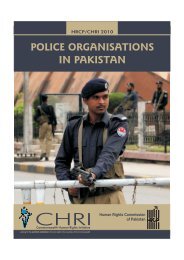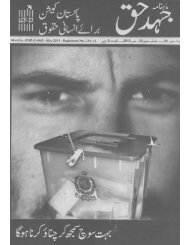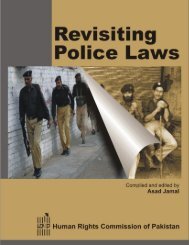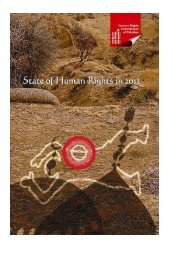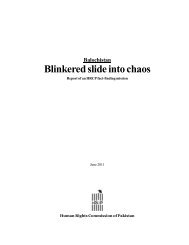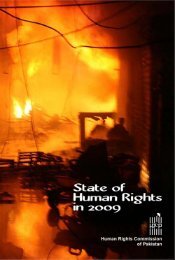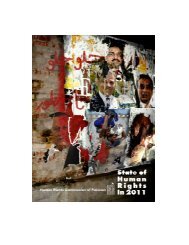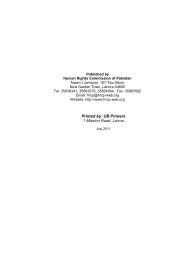Download PDF file - HRCP
Download PDF file - HRCP
Download PDF file - HRCP
Create successful ePaper yourself
Turn your PDF publications into a flip-book with our unique Google optimized e-Paper software.
<strong>HRCP</strong> fact-finding missions’ report 55<br />
Appendix ‘C’<br />
Human rights in Balochistan<br />
and<br />
Balochistan’s rights<br />
Report of a fact-finding mission: October 2003<br />
Introduction<br />
The Human Rights Commission of Pakistan (<strong>HRCP</strong>) has been taking various measures to apprise itself of the<br />
state of human rights in the province of Balochistan. The provincial chapter at Quetta keeps a watch on developments,<br />
positive as well as negative, that have any bearing on the basic rights of the people. It organises, among other<br />
activities, fact-finding missions as and when warranted by circumstances. Investigations into human rights violations<br />
of local nature are regularly carried out by district core groups and activists. Their reports are published in the<br />
monthly Jehd-i-Haq, of which a combined Balochi-Pushtu edition is also published. In 2001 when large parts of the<br />
province were hit by drought the <strong>HRCP</strong> chairperson Afrasiab Khattak himself led an inquiry mission. Every two years<br />
or so the <strong>HRCP</strong> Council, the organisation’s executive body, meets in Quetta to enable its members to gain first-hand<br />
knowledge of the ground reality and interact with the leaders of public opinion and the provincial civil society.<br />
However, the need for continuous overseeing of the human rights situation in Balochistan, as in other parts of the<br />
country, can hardly be gainsaid.<br />
In October 2003 the commission decided to organise a high-powered fact-finding mission to undertake a broad<br />
survey of the human rights situation over a sizeable area of the province. The mission was led by the <strong>HRCP</strong> Secretary-<br />
General, Ms Hina Jilani, who is also the UN Secretary-General’s Special Representative on Human Rights Defenders,<br />
and included 13 other members of the Council. The mission was divided into five teams that visited Gwadar, Turbat<br />
(and Tump), Khuzdar, Loralai and Quetta. (See Annexure I) The members of the teams met a large number of people<br />
in the administration, as well as representatives of political parties, lawyers, journalists, and social activists, to elicit<br />
their views on a broad range of issues of concern to them. A preliminary mission statement containing a summary of<br />
its findings was released to the media on October 26, 2003. (See Annexure II) A more detailed report of the mission’s<br />
findings and recommendations is given in the following pages.<br />
<strong>HRCP</strong> is conscious of the fact that its mission may not have been able to cover each and every issue of concern<br />
to the people of Balochistan and that some of the matters it tried to address demand further study and analysis.<br />
However, it has decided to release this report because it does touch upon quite a few issues that have been agitating<br />
the minds of the conscious sections of Balochistan society. These issues call for urgent remedial action by the state<br />
and the civil society both if they are not to be allowed to develop into serious and dangerous causes of discontent.<br />
A large number of people responded to the call of the mission at short notice and freely gave of their time. <strong>HRCP</strong><br />
thanks them for their kind and generous support and acknowledges their contribution to the furtherance of the cause<br />
of human rights. The whole of Balochistan, as usual, was a wonderful host and <strong>HRCP</strong> hopes to be able to savour<br />
more of its hospitality and its candid discourse.



